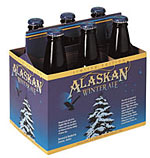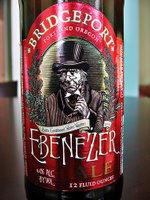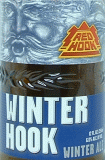A Flurry of Winter Ales
Never mind the 65 degree weather, 'tis the season ... for winter ales. In fairness, global warming may be to blamed for the cognitive dissonance--isn't late October generally at least chilly? In any case, I have a few mini-reviews here. Two of the four deserve revisiting later, once they've had a chance to age and mellow. As is the case every year, the first bottles of Jubelale are a little green. (Wassail is generally also, though I failed to buy a sixer at the single grocery store I saw it--downtown Safeway, I think--and haven't seen it since.)
The Style
There is no actual, or sole, "winter warmer" style. Breweries have wide latitude this one season each year to create a truly unique beer. Broadly speaking, these beers should be strong and robust, providing enough flavor and alcohol to warm your core. But whether that's a doppelbock, a strong ale, a stout, or something without category--that's the brewery's choice. We've had an ongoing discussion on Beervana about the characteristics of the "Northwest style," and I think you can see it clearly around this time of year. Oregon (and Washington) breweries tend to go to dark malts and rich complexity. Although hops are celebrated, almost without exception these beers resist the label of "out of balance" or "overly hoppy." In many ways, I think they represent the truest passions of the brewers who make them.
Alaskan Winter Ale
 This beer is aiming for something greater than it actually achieves. Brewed in the style of an old ale, Alaskan adds the tips of Sitka Spruce for character. It is amber, rather on the pale side, with a very light (and quickly-evaporating head). I got a sweet caramel nose that may have had a note of diacetyl and also may have had a bit of spruce, but both were rather shadowy. The flavor of the beer is likewise subdued--mellow and sweet, with a butterscotch candy palate and a mild pineyness that may have come from the spruce. I also thought I detected a mint quality which I retrospectively identify as spruce. The sum is not quite the promise of the parts. I'd like a little more of everything--maltiness, hops, and spruce. Call it an interesting experiment that needs to be taken an iteration further.
This beer is aiming for something greater than it actually achieves. Brewed in the style of an old ale, Alaskan adds the tips of Sitka Spruce for character. It is amber, rather on the pale side, with a very light (and quickly-evaporating head). I got a sweet caramel nose that may have had a note of diacetyl and also may have had a bit of spruce, but both were rather shadowy. The flavor of the beer is likewise subdued--mellow and sweet, with a butterscotch candy palate and a mild pineyness that may have come from the spruce. I also thought I detected a mint quality which I retrospectively identify as spruce. The sum is not quite the promise of the parts. I'd like a little more of everything--maltiness, hops, and spruce. Call it an interesting experiment that needs to be taken an iteration further.
Malts: pale, wheat, Munich and caramelized malts, hops: Saaz, alcohol:6.4% abv, original gravity: 1.066; bitterness units: 27. Rating: Average.
Deschutes Jubelale
Here's an interesting factoid: Jubel was the first beer Deschutes ever bottled, a fact about which I was until recently ignorant. Despite this, the brewery seems inevitably to always brew it late and/or release it early, so when I buy my first early-October bottle, it's green and not indicative of the beer will become. And again, as constant as the seasons, the pattern repeated--the beer's too green, but I'm still buying it in October.
Despite this, the brewery seems inevitably to always brew it late and/or release it early, so when I buy my first early-October bottle, it's green and not indicative of the beer will become. And again, as constant as the seasons, the pattern repeated--the beer's too green, but I'm still buying it in October.
What I can tell you is that it's a beautiful chestnut, full of roasty malt aroma and garlanded with a delicious peppery hop. The hops and alcohol currently overwhelm the smoothness of the malt, but give it time. This is typically one of the creamiest and smoothest of the big winter ales, so let's give it an incomplete.
Alcohol:6.7% abv, bitterness units: 60.
BridgePort Ebenezer
 Tawny amber, very bright--looks a lot like an Oktoberfest. Comforting fresh-bread aroma, with a touch of black pepper and cola-like sweetness. I recall this being a slightly harsh, thin-bodied beer, but the 2006 incarnation is neither. It's a mellow, creamy, candyish ale with a slightly piney, spicy hopping. Some winter ales are a little like a brandy, with a sharper alcohol edge, while others are like hot toddies. Put Ebenezer in that last category. As with the Alaskan, I'd like a little more oomph, but Ebenezer has its charms.
Tawny amber, very bright--looks a lot like an Oktoberfest. Comforting fresh-bread aroma, with a touch of black pepper and cola-like sweetness. I recall this being a slightly harsh, thin-bodied beer, but the 2006 incarnation is neither. It's a mellow, creamy, candyish ale with a slightly piney, spicy hopping. Some winter ales are a little like a brandy, with a sharper alcohol edge, while others are like hot toddies. Put Ebenezer in that last category. As with the Alaskan, I'd like a little more oomph, but Ebenezer has its charms.
Alcohol: 6.4% abv, original gravity: 16° Plato; Bitterness Units: 40. Rating: Good.
Redhook Winterhook
Extremely aromatic, rich with green, citrusy Cascades. No mention by the brewery that it's dry-hopped, but I wouldn't bet against it. This incarnation of Winterhook is a strangely summery beer, with a bright, layered hopping that comes off fruity and mild. It must be a new recipe--I recall an older version of Winterhook (it was actually one of the first winter warmers) that was darker and more vibrant.
This incarnation of Winterhook is a strangely summery beer, with a bright, layered hopping that comes off fruity and mild. It must be a new recipe--I recall an older version of Winterhook (it was actually one of the first winter warmers) that was darker and more vibrant.
A recurrent criticism I have with Redhook is similar to Portland Brewing--their beers are far too safe. This is a pleasant and polite beer, the kind you'd take home to someone's mother. But it isn't a hearty ale that could beat back the frost. Even the stats tell the tale--5.5% abv/28 IBUs. I definitely wouldn't turn one down--a beer with this kind of hop aroma is a keeper--but I'd hate to be stuck at a December Seahawks game with nothing more than Winterhook to protect me from the elements.
Malts: English caramel and Munich, hops: Cascade, Northern Brewer, alcohol:5.5% abv, original gravity: 1.053; Bitterness Units: 28, Rating: Good.
The Style
There is no actual, or sole, "winter warmer" style. Breweries have wide latitude this one season each year to create a truly unique beer. Broadly speaking, these beers should be strong and robust, providing enough flavor and alcohol to warm your core. But whether that's a doppelbock, a strong ale, a stout, or something without category--that's the brewery's choice. We've had an ongoing discussion on Beervana about the characteristics of the "Northwest style," and I think you can see it clearly around this time of year. Oregon (and Washington) breweries tend to go to dark malts and rich complexity. Although hops are celebrated, almost without exception these beers resist the label of "out of balance" or "overly hoppy." In many ways, I think they represent the truest passions of the brewers who make them.
Alaskan Winter Ale
 This beer is aiming for something greater than it actually achieves. Brewed in the style of an old ale, Alaskan adds the tips of Sitka Spruce for character. It is amber, rather on the pale side, with a very light (and quickly-evaporating head). I got a sweet caramel nose that may have had a note of diacetyl and also may have had a bit of spruce, but both were rather shadowy. The flavor of the beer is likewise subdued--mellow and sweet, with a butterscotch candy palate and a mild pineyness that may have come from the spruce. I also thought I detected a mint quality which I retrospectively identify as spruce. The sum is not quite the promise of the parts. I'd like a little more of everything--maltiness, hops, and spruce. Call it an interesting experiment that needs to be taken an iteration further.
This beer is aiming for something greater than it actually achieves. Brewed in the style of an old ale, Alaskan adds the tips of Sitka Spruce for character. It is amber, rather on the pale side, with a very light (and quickly-evaporating head). I got a sweet caramel nose that may have had a note of diacetyl and also may have had a bit of spruce, but both were rather shadowy. The flavor of the beer is likewise subdued--mellow and sweet, with a butterscotch candy palate and a mild pineyness that may have come from the spruce. I also thought I detected a mint quality which I retrospectively identify as spruce. The sum is not quite the promise of the parts. I'd like a little more of everything--maltiness, hops, and spruce. Call it an interesting experiment that needs to be taken an iteration further.Malts: pale, wheat, Munich and caramelized malts, hops: Saaz, alcohol:6.4% abv, original gravity: 1.066; bitterness units: 27. Rating: Average.
Deschutes Jubelale
Here's an interesting factoid: Jubel was the first beer Deschutes ever bottled, a fact about which I was until recently ignorant.
 Despite this, the brewery seems inevitably to always brew it late and/or release it early, so when I buy my first early-October bottle, it's green and not indicative of the beer will become. And again, as constant as the seasons, the pattern repeated--the beer's too green, but I'm still buying it in October.
Despite this, the brewery seems inevitably to always brew it late and/or release it early, so when I buy my first early-October bottle, it's green and not indicative of the beer will become. And again, as constant as the seasons, the pattern repeated--the beer's too green, but I'm still buying it in October.What I can tell you is that it's a beautiful chestnut, full of roasty malt aroma and garlanded with a delicious peppery hop. The hops and alcohol currently overwhelm the smoothness of the malt, but give it time. This is typically one of the creamiest and smoothest of the big winter ales, so let's give it an incomplete.
Alcohol:6.7% abv, bitterness units: 60.
BridgePort Ebenezer
 Tawny amber, very bright--looks a lot like an Oktoberfest. Comforting fresh-bread aroma, with a touch of black pepper and cola-like sweetness. I recall this being a slightly harsh, thin-bodied beer, but the 2006 incarnation is neither. It's a mellow, creamy, candyish ale with a slightly piney, spicy hopping. Some winter ales are a little like a brandy, with a sharper alcohol edge, while others are like hot toddies. Put Ebenezer in that last category. As with the Alaskan, I'd like a little more oomph, but Ebenezer has its charms.
Tawny amber, very bright--looks a lot like an Oktoberfest. Comforting fresh-bread aroma, with a touch of black pepper and cola-like sweetness. I recall this being a slightly harsh, thin-bodied beer, but the 2006 incarnation is neither. It's a mellow, creamy, candyish ale with a slightly piney, spicy hopping. Some winter ales are a little like a brandy, with a sharper alcohol edge, while others are like hot toddies. Put Ebenezer in that last category. As with the Alaskan, I'd like a little more oomph, but Ebenezer has its charms.Alcohol: 6.4% abv, original gravity: 16° Plato; Bitterness Units: 40. Rating: Good.
Redhook Winterhook
Extremely aromatic, rich with green, citrusy Cascades. No mention by the brewery that it's dry-hopped, but I wouldn't bet against it.
 This incarnation of Winterhook is a strangely summery beer, with a bright, layered hopping that comes off fruity and mild. It must be a new recipe--I recall an older version of Winterhook (it was actually one of the first winter warmers) that was darker and more vibrant.
This incarnation of Winterhook is a strangely summery beer, with a bright, layered hopping that comes off fruity and mild. It must be a new recipe--I recall an older version of Winterhook (it was actually one of the first winter warmers) that was darker and more vibrant.A recurrent criticism I have with Redhook is similar to Portland Brewing--their beers are far too safe. This is a pleasant and polite beer, the kind you'd take home to someone's mother. But it isn't a hearty ale that could beat back the frost. Even the stats tell the tale--5.5% abv/28 IBUs. I definitely wouldn't turn one down--a beer with this kind of hop aroma is a keeper--but I'd hate to be stuck at a December Seahawks game with nothing more than Winterhook to protect me from the elements.
Malts: English caramel and Munich, hops: Cascade, Northern Brewer, alcohol:5.5% abv, original gravity: 1.053; Bitterness Units: 28, Rating: Good.